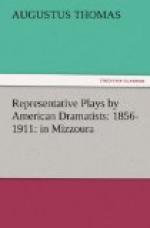There must be love interest, of course.
A sheriff would presumably be a bit of the rough diamond; contrast wherein “lieth love’s delight” prompted a girl apparently of a finer strain than himself; and conflict necessitated a rival. The girl should be delicate and educated, the rival should be attractive but unworthy; and to make him doubly opposed to Goodwin I decided to have him an outlaw—someone whom it would be the sheriff’s duty and business—business used in the stage sense—to arrest.
Four or five years before the Goodwin contract, I had been one of the Post-Dispatch reporters on the “Jim Cummings” express robbery. That celebrated and picturesque case was of a man who presented to an express messenger at the side door of his express car, just as the train was pulling from the St. Louis station, a forged order to carry the bearer, dead-head, to a certain distant point on the run. The messenger helped the dead-head into his car, and chummed with him, until about an hour later, when, as he was on his knees arranging some of his cargo, he found a pistol muzzle against his cheek, and his smiling visitor prepared to bind and gag him. Having done this, the stranger packed one hundred and twenty thousand dollars into a valise; and dropped off into the dark, when the train made its accustomed stop at a water-tank. The whole enterprise was so gentle, that the messenger was arrested and held as an accomplice, while the Pinkertons looked for the man with the money.
The robber was a kind-hearted person; and, being really grieved over the detention of an innocent man, wrote several exculpating letters to the papers, enclosing rifled express envelopes to prove his peripatetic identity. These letters were signed “Jim Cummings,” a nom de guerre borrowed from an older and an abler offender of the Jesse James vintage.
After he was arrested and in his cell in the St. Louis jail, “Jim Cummings” and I became friends, as criminals and newspaper men sometimes do, and as criminals and I always have done, everywhere, most easily. The details of his arrangements, both before and after his draft on the company, were minutely in my mind, and were so very vital that, with the first need for a drama criminal, I took him. Goodwin’s rival should be Jim Cummings; a glorified and beautiful and matinee Cummings, but substantially he.
This adoption rescued the girl and the sheriff from the hazy geography of the mining camps, and fixed the trio in Missouri.
After Cummings had dropped from the express car, he had walked some fifteen miles to the Missouri River, near St. Charles, and had then gone north on a train through Pike County. I had more than once made the same trip on freight trains; and I had a liking for the county as the home district of Champ Clark, a politico-newspaper comrade of several legislative sessions and conventions. Newspaper experience in those days, before the “flimsy” and the “rewrite,” emphasized the value of going to the place in order to report the occurrence; and I knew that, aside from these three characters and their official and sentimental relationships, the rest of my people and my play were waiting for me in Bowling Green.




